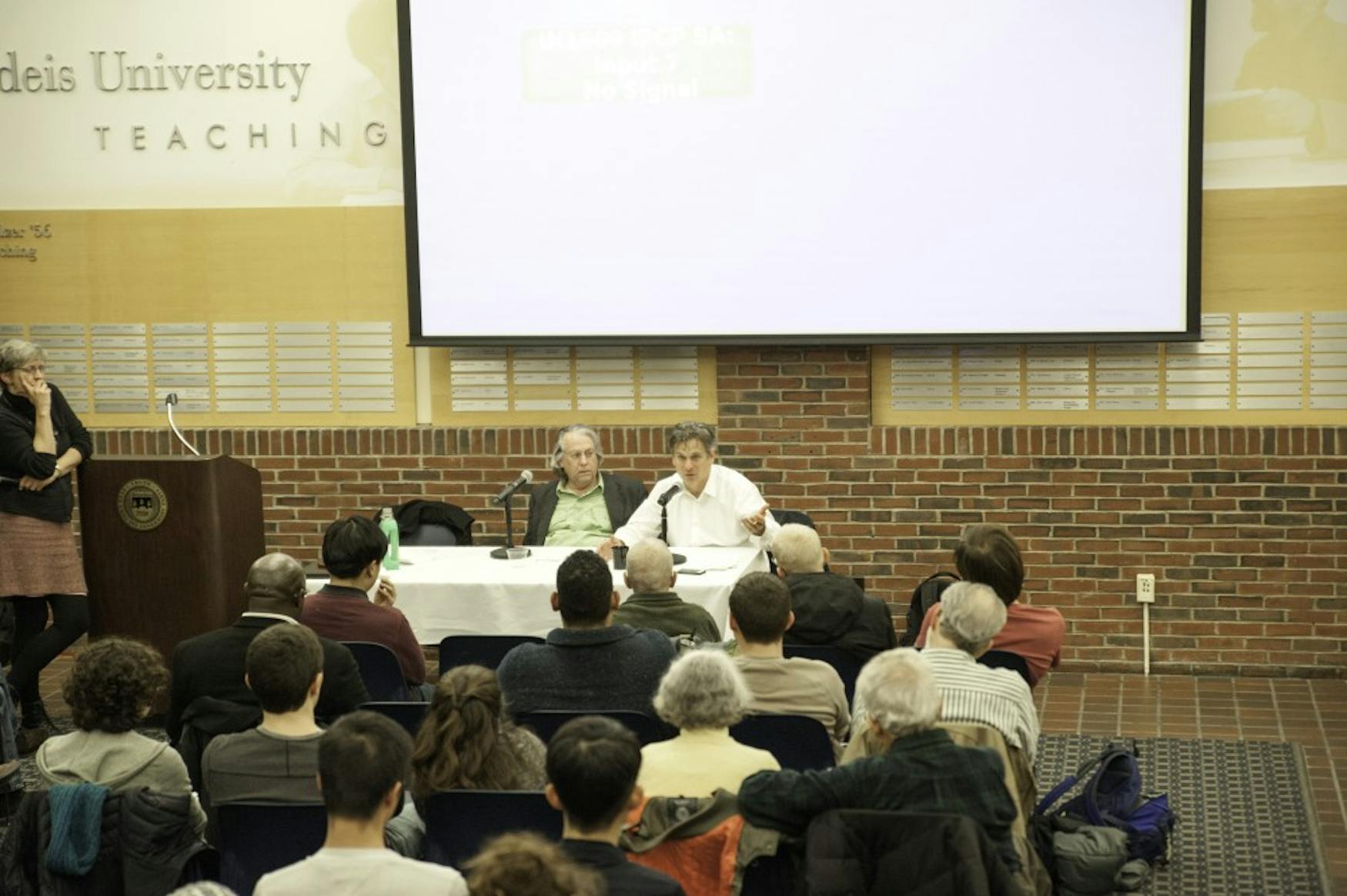Visiting profs debate clean energy initiatives
Representing two countries’ views on the controversial issue of nuclear power, Professor Kerry Emanuel and Christoph Stefes debated each other last Monday night, asking the question: “Is Nuclear Energy Clean Energy?”
Hosted by the Center for German and European Studies, the debate was inspired by the distinct difference in the way nuclear energy is regarded by German and American audiences. As Prof. Sabine von Mering (GER), who introduced and directed the debate, explained, climate scientists in America are generally in favor of nuclear energy as an alternative to fossil fuels, while German scientists and citizens generally reject nuclear energy in favor of renewable energy sources.
A professor and climate scientist at the Massachusetts Institute of Technology, Emanuel represented the “American” perspective in the debate. Stefes, a University of Colorado Denver professor of post-Soviet Union political development, represented the “German” point of view.
Emanuel’s argument focused on the danger our environment faces from carbon dioxide emissions from burning coal. Looking for “an intelligent mix of non-carbon energies,” Emanuel argued that nuclear power — alongside renewable energy sources — is a necessity for powering the world without coal. Renewable energy sources like solar and wind power face technological and storage limitations, and will only be able to provide, on average, about 30 percent of the world’s total energy needs, according to Emanuel. These problems stem from the fact that renewable energy sources are hard to control, and that current storage technology is not equipped to store extra energy for days when not enough energy is created.
Stefes countered Emanuel’s assertion that renewable energy sources should always work in tandem with nuclear ones. Rather, Stefes sees nuclear energy as a “‘bridge technology’ … something to use until you find something better.” Instead of investing money in nuclear energy sources, governments should put resources into improving renewable energy “to realize the transition toward a truly green, sustainable energy systems,” he said.
The specific issue of the debate — whether nuclear power is a green source of energy — was a point of agreement for the professors at first, as they both said nuclear energy is “greener” than coal. However, they disagreed on the value of that difference, with Stefes arguing “that is not saying much” and that nuclear power is “still a relatively dirty and dangerous energy source.”
That view of nuclear power is common in Germany, where there were massive protests against nuclear power after nuclear reactors were damaged by a 2011 earthquake and tsunami in Fukushima, Japan.
As a result, German Chancellor Angela Merkel “immediately shut down eight of the country’s 17 reactors” and under her leadership, “Germany is now scheduled to take its last nuclear power plant off the grid by 2022,” according to the event’s description online.
Since then, Germany has revolutionized its energy system, providing massive government subsidies for renewable energy, according to Stefes. “I think Germany is well on the way to a green … renewable energy system, and we can do that without nuclear power,” he said.
While Emanuel agrees the German example has been a success, he sees it as a “miracle,” rather than a solution which can be adopted by the entire world. While Germany has had certain days where its solar and wind farms have powered the country with entirely renewable energy, Emanuel points out that these energy sources are not constant or controllable. When renewable sources do not provide enough energy, “you have to have neighbors to buy [energy] from” — neighbors with reliable energy sources, like nuclear power.
The developing world’s new and ever-increasing need for energy — an important component in modernization and escaping poverty — was an issue prevalent throughout the debate. Emanuel saw nuclear energy as the only way to satisfy developing nations’ energy needs without massive carbon dioxide emissions from burning coal. According to Emanuel, modern nuclear reactors, which are safer and more effective than older, traditional models, could be the key to helping the developing world without speeding up climate change.
Stefes agreed the problem existed, but he did not believe nuclear power is the answer. According to Stefes, the energy production system a nation establishes in its beginning sets the country on a path which is “particularly difficult to get off.” The developing world has a chance to establish renewable energy sources as the standard, rather than something which must be later reached for, he asserted. “The developing world right now actually … has a chance to make a new path,” Stefes said.
This debate centered on important issues which will, in one way or another, shape the future of our world, and which attract strong opinions to different sides of the debate. However, von Mering reminded the audience at the beginning of the debate that disagreement between the experts was the point of the event, saying, “We too often seem to be in agreement with each other.”
This debate concluded the 2017 Campusweeks program at Brandeis, a series of debates about issues relevant to Germany.
This program, sponsored by the German embassy in Washington, encourages universities to host events centered on Germany. This year’s theme was “Making Choices.”



Please note All comments are eligible for publication in The Justice.